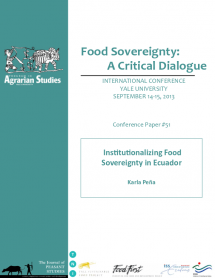Ideas into movement
Boost TNI's work
50 years. Hundreds of social struggles. Countless ideas turned into movement.
Support us as we celebrate our 50th anniversary in 2024.

As one of the first nations to incorporate food sovereignty as a constitutional right, Ecuador is an interesting case study to further our understanding of the food sovereignty conceptual framework.

As one of the first nations to incorporate food sovereignty as a constitutional right, Ecuador is an interesting case study to further our understanding of the food sovereignty conceptual framework. Social movements were influential in incorporating food sovereignty into the 2008 Ecuadorian Constitution that later developed into a food sovereignty legal framework with the approval of the Food Sovereignty Law (LORSA) in 2009. To further develop this legal framework, the Conferencia Plurinacional e Intercultural de Soberania Alimentaria (COPISA) was created in 2010 as a participatory organization responsible for drafting nine-supplementary laws that support the LORSA. In this paper I look at how and why food sovereignty was incorporated into the 2008 Constitution followed by an analysis of the relationship that has developed between social movements and the state since then. Based on quantitative and qualitative data collected in Ecuador in 2012 through in-depth key informant interviews and participatory observations, I also explore the food sovereignty policy-making workshops fostered by COPISA. This research demonstrates social movements in Ecuador are negotiating with the state in ways that differ from previous attempts and that this relationship is developing a food sovereignty legal framework that is pushing the state to rethink and reshape the politics that govern food. What remains uncertain is how this relationship evolves beyond the process of policy formation to implementation.
Karla Peña is a Researcher, Ecology Center, Ann Arbor, Michigan A researcher for the Ann Arbor-based environmental non-profit organization, Ms. Peña earned her Masters of Science degree from the University of Michigan School of Natural Resources and Environment. Broadly, she is interested in ethnic politics and questions of rural and agricultural development in the Andes.
Food Sovereignty: a critical dialogue, 14 - 15 September, New Haven.